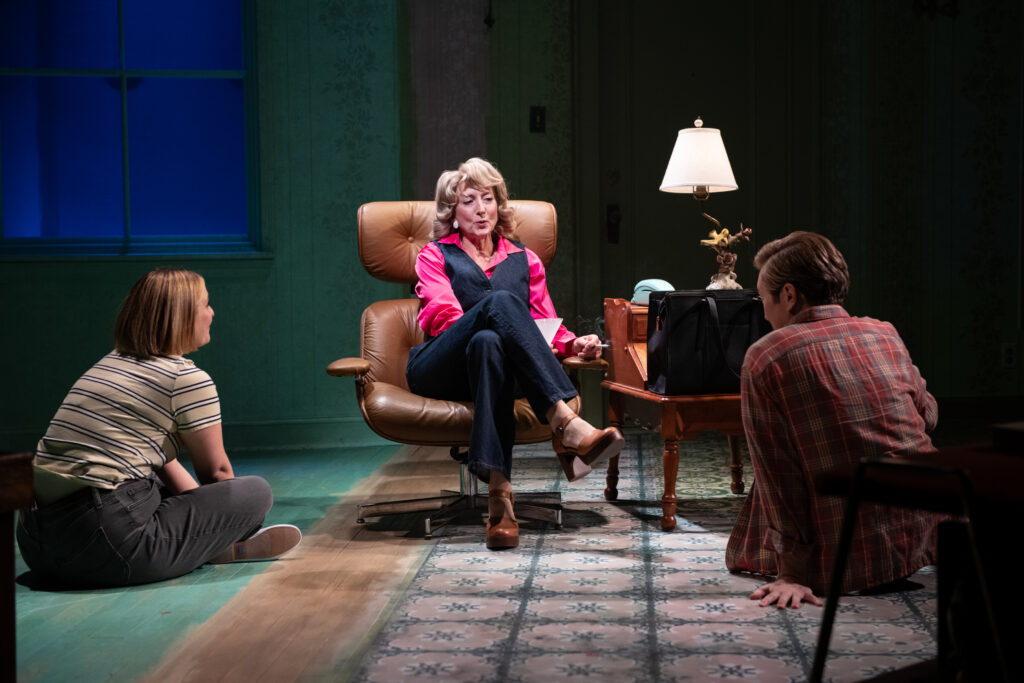To look at the current and imminent movies “Springsteen: Deliver Me From Nowhere,” “Jay Kelly,” “Sentimental Value,” “Train Dreams,” “Hamnet” and even Guillermo Del Toro’s new “Frankenstein” is to conclude that absent, neglectful or abusive dads are the defining theme of awards season. Similarly, a trio of DMV plays are exploring the pains and perils of parenthood: “A Case For the Existence of God” is about a pair of first-year baby daddies, Synetic’s “Frankenstein” (the fourth local version of the tale in six months) has Prometheus creating a monster, and “The Mother Play” takes a hard look at how the obligations between parents and children shift as the decades pile up.
‘A Case for the Existence of God’
Samuel D. Hunter’s tender 2022 drama about two single dads of infant daughters connecting across boundaries of race, sexual orientation and education gets a sturdy staging from Danilo Gambini for Mosaic Theater Company. It’s a bravura showcase for actors Lee Osorio and Jaysen Wright.
Wright’s Keith is a mortgage broker who wants nothing more than to adopt the baby girl he’s been fostering for almost a year — a process that’s imperiled when a relative of the baby’s birth mother learns Keith is gay. Ryan is a soon-to-be-divorced factory worker who comes to Keith seeking a loan to buy a plot of land once occupied by his ancestors. He’s terrified he’ll lose shared custody of his 1-year-old.
These two pops are the same age, as are their little girls, but every other demographic detail between them is a chasm. When Keith describes an experience as “harrowing,” Ryan is just as flummoxed by the fancy adjective as he is by the lending-industry lingo in his mortgage application. But he’s emotionally intelligent enough to eventually say, “I think we share a specific kind of sadness, you and I.” To Keith, who still carries the scars of growing up Black and queer in Twin Falls, Idaho, such vulnerability from a guy who plainly does not recall how cruel he was to Keith in high school is shocking.
Hunter previously established himself as a skilled chronicler of red-state isolation in plays like “A Bright New Boise” and “The Whale” (which became a divisive-but-Oscar-winning 2022 film). He reaches for something profound by just letting these guys talk over increasingly whiskey-fueled, decreasingly mortgage-focused meetings in Keith’s six-windowed cube of an office, which scenic designer Nadir Bey eventually transforms into something more symbolic. He gets there, too.
A Case for the Existence of God, through Dec. 14 at Atlas Performing Arts Center in Washington. 100 minutes, no intermission. mosaictheater.org.
‘Frankenstein; or, the Modern Prometheus’
There are Frankensteins where the poor Creature speaks fluently, like he does in Mary Shelley’s immortal novel, and others where his vocabulary is confined to howls and moans. Synetic Theater has now done both. Reviewing a 2006 “Frankenstein” by Synetic co-founder Paata Tsikurishvili and Nathan Weinberger, then-Washington Post theater critic Peter Marks wrote, “The stolid dialogue … sometimes sounds as if it’s from the stilted age when horror-movie talkies were born.”
Little wonder, then, that for their new iteration of the monster mash, Tsikurishvili and Weinberger (as director and dramaturge/adapter, respectively) have eighty-sixed speech altogether, along with the particulars of Shelley’s story, keeping just the premise of a terrifyingly strong artificial man who revenges himself upon on his deadbeat dad.
Prometheus is not merely a mythological allusion here, as in the full title of Shelley’s novel, but the principal character, played by Synetic company member Alex Mills. In this version, set in some blasted apocalyptic wilderness, it’s Prometheus who cobbles together a zombie out of corpse parts. The MacGuffin of the Prometheus myth, Fire, gets embodied by an actor, too, in Philip Fletcher. It sounds confusing because it is.
The Creature is brought to menacing, pitiable life by the burly but graceful Vato Tsikurishvili. There’s no denying the visceral power of his birth scene: He crawls toward us, shivering and hyperventilating from the shock of sudden consciousness, before Prometheus tries to help him walk on two feet. It’s a pity he doesn’t rise from Prometheus’s makeshift operating table (the set and props are by Phil Charlwood) until a third of the way through the show, which buzzes with Synetic’s usual athleticism and conceptual ambition but is also opaque, repetitive and — in the multiuse confines of the Thomas Jefferson Theatre — simply difficult to see.
Erik Teague’s costumes, for example, reveal fascinating textures and detail in the production photos, giving the Creature patches of exposed musculature and another character gruesomely gouged-out eyes. But even sitting just a few rows from the stage, those costumes read only as an undifferentiated collection of rags. In their effort to conjure a unified mood of foreboding, Teague and lighting designer Brian S. Allard have cannibalized each other’s imaginative work.
Maryam Najafzada plays Gaia, a young woman driven to madness and self-mutilation by the death of her baby. Shelley had already experienced the loss of one child when she wrote “Frankenstein,” and only her fourth would survive to adulthood, so this tragic extratextual material is apt. But without any projected title cards or even a plot synopsis to help us follow, this overlong variation on an already much-explored theme is more puzzling than exhilarating.
Frankenstein; or, the Modern Prometheus, through Nov. 23 at Thomas Jefferson Community Theatre in Arlington. 95 minutes, no intermission. synetictheater.org.
‘The Mother Play: A Play in Five Evictions’
DMV native Paula Vogel has previously taken inspiration from her brother and her mother for “The Baltimore Waltz” and the Pulitzer-winning “How I Learned to Drive,” respectively. “The Mother Play: A Play in Five Evictions,” which director Margot Bordelon has brought to Studio Theatre following its Jessica Lange-starring Broadway debut last year, is Vogel’s most openly autobiographical drama. It traces 40-odd years in her relationship with hard-drinking single mom Phyllis and sensitive brother Carl from 1964 through the 2000s.
Kate Eastwood Norris is a jittery marvel as Phyllis, who never wanted kids and is mortified that she wound up with a pair of queer ones. Vogel’s stand-in, Martha (played by Zoe Mann, also our narrator), is 12 years old as the show opens, and more reliant on Carl for paternal nurturing than Phyllis, who’s too busy trying to make rent on their roach-infested Adelphi, Maryland, apartment to offer much affection or advice. (To create that roach infestation, Shawn Boyle has created projections more, what’s the word, harrowing than the ones in Synetic’s “Frankenstein.”)
At 14, Carl is already prone to swooning pronouncements such as “I am the lost Romanov!” But he’s also the one who, after Martha suffers a sexual assault on the school bus, gives his little sister practical Shakespearean-comedy-style advice on how to dress and walk defensively — that is, as a man.
Phyllis’s kids never stop trying to educate and forgive her as the decades grind along, from the free-loving ’60s to the plague-stricken ’80s and beyond. Mann sells the illusion of growing from a precocious preadolescent to an exhausted middle-aged woman with skill, and as Carl, Stanley Bahorek finds little ways to show us he probably isn’t quite the selfless saint of Martha’s mournful memory. For Bordelon and her cast to convey so much in so little time is a remarkable achievement.
The Mother Play: A Play in Five Evictions, through Jan. 4 at Studio Theatre. 90 minutes, no intermission. studiotheatre.org.
The post Three new plays about parenting — including yet another ‘Frankenstein’ appeared first on Washington Post.




